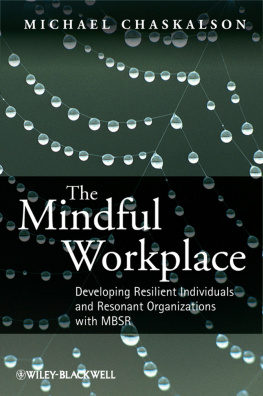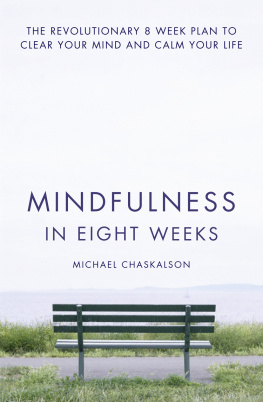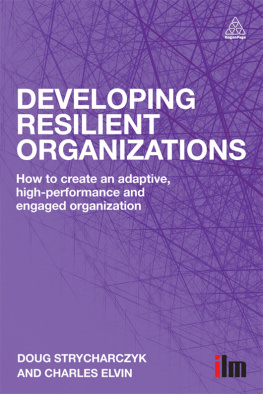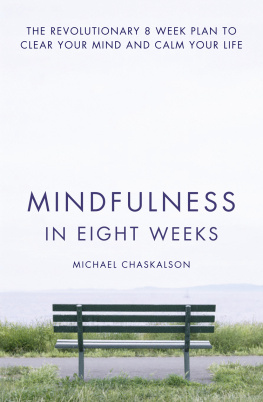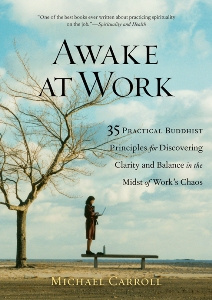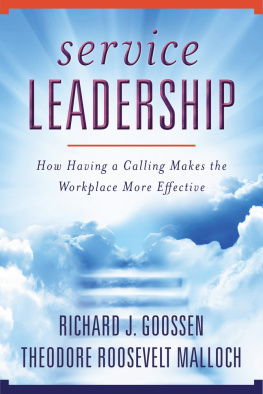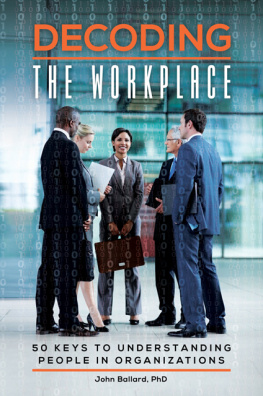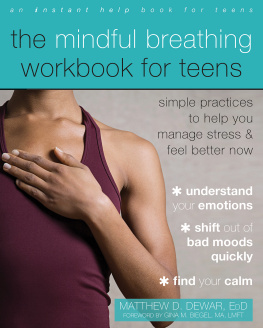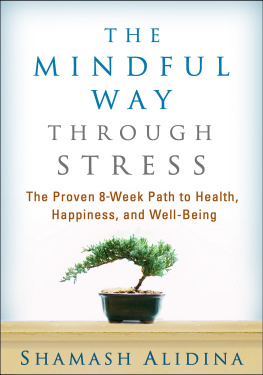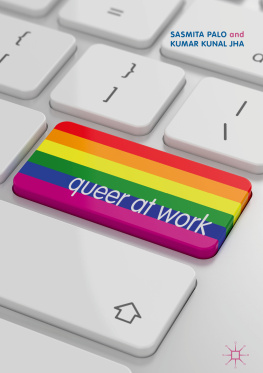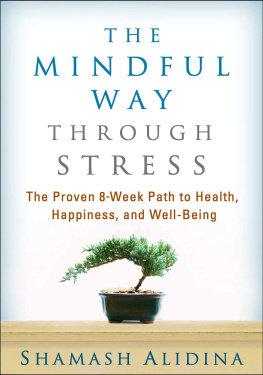Chaskalson - The mindful workplace: developing resilient individuals and resonant organizations with MBSR
Here you can read online Chaskalson - The mindful workplace: developing resilient individuals and resonant organizations with MBSR full text of the book (entire story) in english for free. Download pdf and epub, get meaning, cover and reviews about this ebook. City: Malden;MA, year: 2011, publisher: John Wiley & Sons, genre: Romance novel. Description of the work, (preface) as well as reviews are available. Best literature library LitArk.com created for fans of good reading and offers a wide selection of genres:
Romance novel
Science fiction
Adventure
Detective
Science
History
Home and family
Prose
Art
Politics
Computer
Non-fiction
Religion
Business
Children
Humor
Choose a favorite category and find really read worthwhile books. Enjoy immersion in the world of imagination, feel the emotions of the characters or learn something new for yourself, make an fascinating discovery.
- Book:The mindful workplace: developing resilient individuals and resonant organizations with MBSR
- Author:
- Publisher:John Wiley & Sons
- Genre:
- Year:2011
- City:Malden;MA
- Rating:3 / 5
- Favourites:Add to favourites
- Your mark:
- 60
- 1
- 2
- 3
- 4
- 5
The mindful workplace: developing resilient individuals and resonant organizations with MBSR: summary, description and annotation
We offer to read an annotation, description, summary or preface (depends on what the author of the book "The mindful workplace: developing resilient individuals and resonant organizations with MBSR" wrote himself). If you haven't found the necessary information about the book — write in the comments, we will try to find it.
Chaskalson: author's other books
Who wrote The mindful workplace: developing resilient individuals and resonant organizations with MBSR? Find out the surname, the name of the author of the book and a list of all author's works by series.
The mindful workplace: developing resilient individuals and resonant organizations with MBSR — read online for free the complete book (whole text) full work
Below is the text of the book, divided by pages. System saving the place of the last page read, allows you to conveniently read the book "The mindful workplace: developing resilient individuals and resonant organizations with MBSR" online for free, without having to search again every time where you left off. Put a bookmark, and you can go to the page where you finished reading at any time.
Font size:
Interval:
Bookmark:

This edition first published 2011
2011 John Wiley & Sons, Ltd.
Wiley-Blackwell is an imprint of John Wiley & Sons, formed by the merger of Wileys global Scientific, Technical and Medical business with Blackwell Publishing.
Registered Office
John Wiley & Sons Ltd, The Atrium, Southern Gate, Chichester, West Sussex, PO19 8SQ, UK
Editorial Offices
The Atrium, Southern Gate, Chichester, West Sussex, PO19 8SQ, UK
350 Main Street, Malden, MA 02148-5020, USA
9600 Garsington Road, Oxford, OX4 2DQ, UK
For details of our global editorial offices, for customer services, and for information about how to apply for permission to reuse the copyright material in this book please see our website at www.wiley.com/wiley-blackwell.
The right of Michael Chaskalson to be identified as the author of this work has been asserted in accordance with the UK Copyright, Designs and Patents Act 1988.
All rights reserved. No part of this publication may be reproduced, stored in a retrieval system or transmitted, in any form or by any means, electronic, mechanical, photocopying, recording or otherwise, except as permitted by the UK Copyright, Designs and Patents Act 1988, without the prior permission of the publisher.
Wiley also publishes its books in a variety of electronic formats. Some content that appears in print may not be available in electronic books.
Designations used by companies to distinguish their products are often claimed as trademarks. All brand names and product names used in this book are trade names, service marks, trademarks or registered trademarks of their respective owners. The publisher is not associated with any product or vendor mentioned in this book. This publication is designed to provide accurate and authoritative information in regard to the subject matter covered. It is sold on the understanding that the publisher is not engaged in rendering professional services. If professional advice or other expert assistance is required, the services of a competent professional should be sought.
Library of Congress Cataloging-in-Publication Data
Chaskalson, Michael.
The mindful workplace : developing resilient individuals and resonant organizations with MBSR / Michael Chaskalson.
p. cm.
Includes index.
ISBN 978-0-470-66158-1 (cloth) ISBN 978-0-470-66159-8 (pbk.)
1. MeditationTherapeutic use. 2. Mindfulness-based cognitive therapy. 3. Stress management. 4. Job stressPrevention. I. Title.
RC489.M55C43 2011
615.8'52dc22
2011009383
A catalogue record for this book is available from the British Library.
This book is published in the following electronic formats: ePDFs 9781119976981; Wiley Online Library 9781119976974; ePub 9781119976912; eMobi 9781119976929
To John Teasdale, Becca Crane and Ciaran Saunders (Ruchiraketu) for all the stimulating conversations on mindfulness and related themes. And to Annette (Dhirangama) for her love, kindness and constant support.
Thanks to Darren Reed, my editor at Wiley-Blackwell, for proposing this book and for steering it through the processes of publication with consummate grace. And to Leah Morin, for her wonderfully tactful, accurate and kindly copy-editing. Its been a delight to work with them both.
Foreword
We are entering a world of work where the combination of ever increasing globalization and technological advances are breaking our work up into ever smaller fragments. Faced with a continuous barrage of emails, constantly ringing phones, ever more demanding Twitter feeds and insistent Facebook updates, its easy to let the instant, the pressing and the immediate overwhelm the important and the longer term. We are becoming overwhelmed by the sheer size of connectivity: over five billion people will soon potentially be connected to each other.
Its no surprise that, for many of us, three minutes is about as long as we can concentrate before being interrupted, and our relationships are becoming increasingly virtual and alienated. The results can be devastating. Skills become denuded as less time is spent in precious concentration, anxiety rises as the immediate overwhelms any sense of boundaries between us and our work, and loneliness becomes the central motif of much of our working lives. Faced with the sheer volume of stimulation, we are living our working lives on automatic pilot.
Yet, faced with the challenge of fragmentation and loneliness, what we need is not yet more careful time-management skills to eke out every last second; it is not the future promise of cognitive assistants capable of managing our inboxes; it is not even another programme to network and influence people. No: what we need is a way of thinking more mindfully about ourselves, our work and our companies. This message of mindfulness becomes ever more insistent when we consider the potential joy that longevity will bring to our working lives. The 50 years that many of us can expect to work could be a period of great meaning and satisfaction. But it also has the possibility of simply elongating what is already an energy-draining activity. Our working lives are rapidly shifting from a race to a marathon. Burnout for peak performance may have worked for a race but it does not provide the resilience that a marathon takes.
The forces of technology, globalization, connectivity and demography together are creating an increasingly urgent need to shift the way we think about work and the skills and competencies we develop to build resilience. These mindful habits, skills and techniques will be crucial to navigating the road ahead.
It is these habits of mindfulness, the skills of self-awareness and the practices of meditation that Michael describes with so much wisdom and clarity. When we understand ourselves more profoundly, accept ourselves more fully and give ourselves an opportunity to reflect, then we build resilience for the path ahead.
The simplicity of Michaels message is underpinned by profound thought, insight and wisdom. Resilient lives are not made from grand gestures and the construction of grandiose theories. Resilience is built through the everyday, every-minute habits and exercises that punctuate our daily lives. When we consciously and mindfully choose to change the way we work and live, and consciously and mindfully build the habits of meaning into our lives, then we have the chance the promise of working with the forces that will shape our lives, rather than working against them.
Lynda Gratton
Professor of Management Practice
London Business School
Author of The Shift: The Future of Work Is Already Here
Preface
Mindfulness is a way of paying attention, in the present moment, to yourself, others and the world around you. It is a skill that you can train in, using techniques like meditation and yoga. As well see, research shows that people who do that are more aware of their thoughts and feelings and better able to manage them. Mindfulness training boosts your attention and concentration, raises your level of emotional intelligence, increases your resilience and improves your relationships.
This book makes the case for mindfulness training in the workplace. Put simply, its hypothesis is that people who are better at working with their minds and mental states will be more productive than those who are less skilled in these areas. Based on the emerging research evidence around the value of mindfulness training, the book discusses the relevance of that research to the world of work. It also tells the story of how mindfulness emerged from the Buddhist monasteries in which it was cloistered for 2500 years and is now being adopted as a mainstream health-care intervention. Recommended as a frontline treatment by the UK National Institute for Health and Clinical Excellence (NICE), mindfulness is now also being used as a means of increasing resilience and enhancing emotional intelligence and overall effectiveness in a wide range of organizations: banks, media companies, industry, law and accountancy firms, the police, government and the military.
Font size:
Interval:
Bookmark:
Similar books «The mindful workplace: developing resilient individuals and resonant organizations with MBSR»
Look at similar books to The mindful workplace: developing resilient individuals and resonant organizations with MBSR. We have selected literature similar in name and meaning in the hope of providing readers with more options to find new, interesting, not yet read works.
Discussion, reviews of the book The mindful workplace: developing resilient individuals and resonant organizations with MBSR and just readers' own opinions. Leave your comments, write what you think about the work, its meaning or the main characters. Specify what exactly you liked and what you didn't like, and why you think so.

